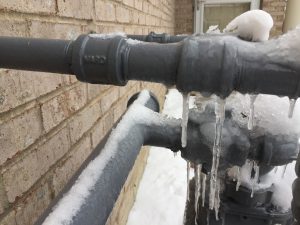Avoid Frozen Plumbing in Winter: Pro Strategies
Avoid Frozen Plumbing in Winter: Pro Strategies
Blog Article
Just how do you feel on the subject of How to Prevent Your Pipes From Freezing?

Cold weather can wreak havoc on your pipes, specifically by freezing pipes. Here's exactly how to stop it from happening and what to do if it does.
Intro
As temperature levels decline, the risk of frozen pipelines boosts, possibly bring about pricey repairs and water damage. Recognizing exactly how to avoid icy pipelines is crucial for property owners in cool climates.
Avoidance Tips
Insulating vulnerable pipes
Cover pipes in insulation sleeves or make use of warm tape to shield them from freezing temperature levels. Focus on pipes in unheated or outside locations of the home.
Home heating techniques
Keep indoor areas effectively warmed, especially locations with pipes. Open up closet doors to allow warm air to distribute around pipelines under sinks.
Exactly how to recognize frozen pipes
Look for decreased water flow from taps, uncommon smells or noises from pipelines, and visible frost on revealed pipelines.
Long-Term Solutions
Architectural changes
Consider rerouting pipes far from exterior walls or unheated areas. Add added insulation to attic rooms, cellars, and crawl spaces.
Upgrading insulation
Invest in premium insulation for pipelines, attic rooms, and walls. Correct insulation aids maintain regular temperatures and lowers the risk of frozen pipes.
Securing Outside Plumbing
Yard pipes and outdoor taps
Detach and drain pipes yard pipes prior to winter. Mount frost-proof faucets or cover exterior taps with protected caps.
Understanding Icy Pipelines
What causes pipes to ice up?
Pipes freeze when subjected to temperature levels listed below 32 ° F (0 ° C) for extended periods. As water inside the pipes ices up, it increases, putting pressure on the pipe walls and potentially triggering them to rupture.
Dangers and damages
Icy pipelines can cause supply of water disturbances, residential or commercial property damage, and costly fixings. Ruptured pipelines can flooding homes and cause substantial architectural damages.
Signs of Frozen Water Lines
Recognizing frozen pipes early can prevent them from bursting.
What to Do If Your Pipes Freeze
Immediate activities to take
If you suspect frozen pipelines, keep taps open up to ease stress as the ice melts. Utilize a hairdryer or towels soaked in warm water to thaw pipes gradually.
Verdict
Protecting against frozen pipelines needs positive steps and fast reactions. By understanding the reasons, indications, and safety nets, homeowners can shield their pipes throughout cold weather.
5 Ways to Prevent Frozen Pipes
Drain Outdoor Faucets and Disconnect Hoses
First, close the shut-off valve that controls the flow of water in the pipe to your outdoor faucet. Then, head outside to disconnect and drain your hose and open the outdoor faucet to allow the water to completely drain out of the line. Turn off the faucet when done. Finally, head back to the shut-off valve and drain the remaining water inside the pipe into a bucket or container. Additionally, if you have a home irrigation system, you should consider hiring an expert to clear the system of water each year.
Insulate Pipes
One of the best and most cost-effective methods for preventing frozen water pipes is to wrap your pipes with insulation. This is especially important for areas in your home that aren’t exposed to heat, such as an attic. We suggest using foam sleeves, which can typically be found at your local hardware store.
Keep Heat Running at 65
Your pipes are located inside your walls, and the temperature there is much colder than the rest of the house. To prevent your pipes from freezing, The Insurance Information Institute suggests that you keep your home heated to at least 65 degrees, even when traveling. You may want to invest in smart devices that can keep an eye on the temperature in your home while you’re away.
Leave Water Dripping
Moving water — even a small trickle — can prevent ice from forming inside your pipes. When freezing temps are imminent, start a drip of water from all faucets that serve exposed pipes. Leaving a few faucets running will also help relieve pressure inside the pipes and help prevent a rupture if the water inside freezes.
Open Cupboard Doors
Warm your kitchen and bathroom pipes by opening cupboards and vanities. You should also leave your interior doors ajar to help warm air circulate evenly throughout your home.

I recently found that blog post about How to prepare your home plumbing for winter weather while browsing on the web. Please take the time to share this write-up if you appreciated it. We take joy in reading our article about Helpful Tips to Prevent Frozen Pipes this Winter.
Schedule Now Report this page